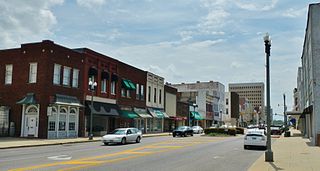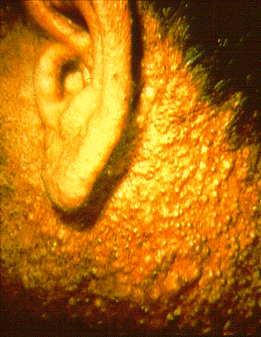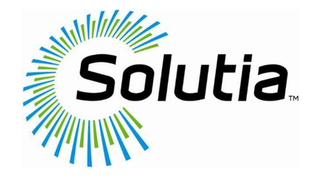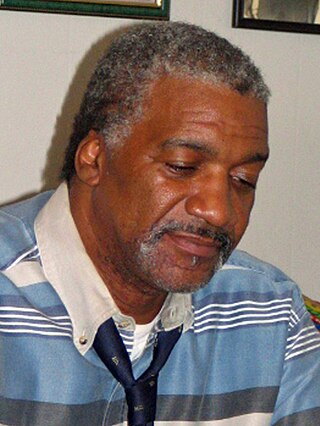Related Research Articles

Polychlorinated biphenyls (PCBs) are highly carcinogenic chemical compounds, formerly used in industrial and consumer products, whose production was banned in the United States by the Toxic Substances Control Act in 1976 and internationally by the Stockholm Convention on Persistent Organic Pollutants in 2001.
The Monsanto Company was an American agrochemical and agricultural biotechnology corporation founded in 1901 and headquartered in Creve Coeur, Missouri. Monsanto's best known product is Roundup, a glyphosate-based herbicide, developed in the 1970s. Later, the company became a major producer of genetically engineered crops. In 2018, the company ranked 199th on the Fortune 500 of the largest United States corporations by revenue.

Anniston is the county seat of Calhoun County in Alabama, United States, and is one of two urban centers/principal cities of and included in the Anniston-Oxford Metropolitan Statistical Area. As of the 2010 census, the population of the city was 23,106. According to 2019 Census estimates, the city had a population of 21,287. Named "The Model City" by Atlanta newspaperman Henry W. Grady for its careful planning in the late 19th century, the city is situated on the slope of Blue Mountain.

Sauget is a village in St. Clair County, Illinois, United States. It is part of Greater St. Louis. The population was 141 at the 2020 census, down from 159 in 2010.

Nitro is a city in Kanawha and Putnam counties in the U.S. state of West Virginia. It takes its name from a World War I era nitrocellulose plant. The population was 6,618 according to the 2020 census. It is part of the Charleston metropolitan area.

BASF SE, an initialism and portmanteau of its original name Badische Anilin- und Sodafabrik, is a European multinational company and the largest chemical producer in the world. Its headquarters are located in Ludwigshafen, Germany.

Chloracne is an acne-like eruption of blackheads, cysts, and pustules associated with exposure to certain halogenated aromatic compounds, such as chlorinated dioxins and dibenzofurans. The lesions are most frequently found on the cheeks, behind the ears, in the armpits and groin region.

Solutia Inc. was an American manufacturer of materials and specialty chemicals including polyvinyl butyral (PVB), ethylene vinyl acetate (EVA), and thermoplastic polyurethane (TPU) interlayers for laminated glass, aftermarket window films, protective barrier and conductive films, and rubber processing chemicals. The company was formed on September 1, 1997, as a divestiture of the Monsanto Company chemical business. In July 2012, the company was acquired by Eastman Chemical Company.
Halocarbon compounds are chemicals in which one or more carbon atoms are linked by covalent bonds with one or more halogen atoms resulting in the formation of organofluorine compounds, organochlorine compounds, organobromine compounds, and organoiodine compounds. Chlorine halocarbons are the most common and are called organochlorides.

Fort McClellan, originally Camp McClellan, is a decommissioned United States Army post located adjacent to the city of Anniston, Alabama. During World War II, it was one of the largest U.S. Army installations, training an estimated half-million troops. After the war it became the home of the Military Police Corps, the Chemical Corps and the Women's Army Corps. From 1975 and until it was closed in 1999, Fort McClellan was home of the Military Police Corps and the One Station Unit Training (OSUT) Military Police School. Also after World War II and until it was closed in 1999, it was home of the Chemical Corps School, which trained soldiers in chemical warfare. In 1988, Fort McClellan was used as an alternate training academy for the United States Border Patrol. Before its closure by the Base Realignment and Closure commission (BRAC), the post employed about 10,000 military personnel and about 1,500 civilians. It underwent unexploded ordnance (UXO) clean up from 2003 to 2014. Since 2010, about 3,000 acres of the post's brownfield land have been redeveloped as a mixed-use community.
John E. Franz is an organic chemist who discovered the herbicide glyphosate while working at Monsanto Company in 1970. The chemical became the active ingredient in Roundup, a broad-spectrum, post-emergence herbicide. Franz has earned much acclaim and many rewards for this breakthrough. He also has over 840 patents to his name worldwide.

Bayer AG is a German multinational pharmaceutical and biotechnology company and is one of the largest pharmaceutical companies in the world. Headquartered in Leverkusen, Bayer's areas of business include pharmaceuticals, consumer healthcare products, agricultural chemicals, seeds and biotechnology products. The company is a component of the EURO STOXX 50 stock market index.

David A. Baker is an American activist. A former union organizer, Baker is the founder and director of Community Against Pollution.
Community Against Pollution aka Citizens Against Pollution or (CAP) is an organization formed by the residents of Anniston, Alabama, in response to the effects of pollution.
Industrial Bio-Test Laboratories was an American industrial product safety testing laboratory. IBT conducted significant quantities of research for pharmaceutical companies, chemical manufacturers and other industrial clients; at its height during the 1950s, 1960s, and 1970s, IBT operated the largest facility of its kind and performed more than one-third of all toxicology testing in the United States. IBT was later confirmed of engaging in extensive scientific misconduct and fraud, which resulted in the indictment of its president and several top executives in 1981 and convictions in 1983. The revelations of misconduct by IBT Labs led to reforms in the regulation of pesticides in the United States and Canada.
Monsanto was involved in several high-profile lawsuits, as both plaintiff and defendant. It had been defendant in a number of lawsuits over health and environmental issues related to its products. Monsanto also made frequent use of the courts to defend its patents, particularly in the area of agricultural biotechnology. Bayer acquired Monsanto in 2018, and the company has since paid over $10 billion to settle lawsuits involving ex-Monsanto products Roundup, PCBs and Dicamba.
Henry Ticknor DeBardeleben was an American coal magnate from Alabama.
Theodore Swann was an American industrialist and early leader of the chemical industry. He was described by one historian as "a flamboyant Birmingham mogul and New South industrialist."
This is a timeline of Monsanto, a publicly traded American multinational agrochemical and agricultural biotechnology corporation headquartered in Creve Coeur, Greater St. Louis, Missouri.
References
- 1 2 3 Spears, Ellen Griffith (April 2014). Baptized in PCBs: Race, Pollution, and Justice in an All-American Town. Chapel Hill: University of North Carolina Press. p. 60. ISBN 978-1-4696-1171-6.
- ↑ Dracos, Ted (November 2010). Biocidal: Confronting the Poisonous Legacy of PCBs. Beacon Press.
- ↑ "Poisoned By PCBs: "A Lack of Control"". Chemical Industry Archives. Retrieved 30 November 2015.
- ↑ Head, Thomas R. III (Spring 2005). "PCBs—The Rise and Fall of an Industrial Miracle" (PDF). Natural Resources & Environment: 18. Retrieved 30 November 2015.
- ↑ Montague, Peter. "How We Got Here -- Part 1: The History of Chlorinated Diphenyl (PCB's)". HudsonWatch.net.